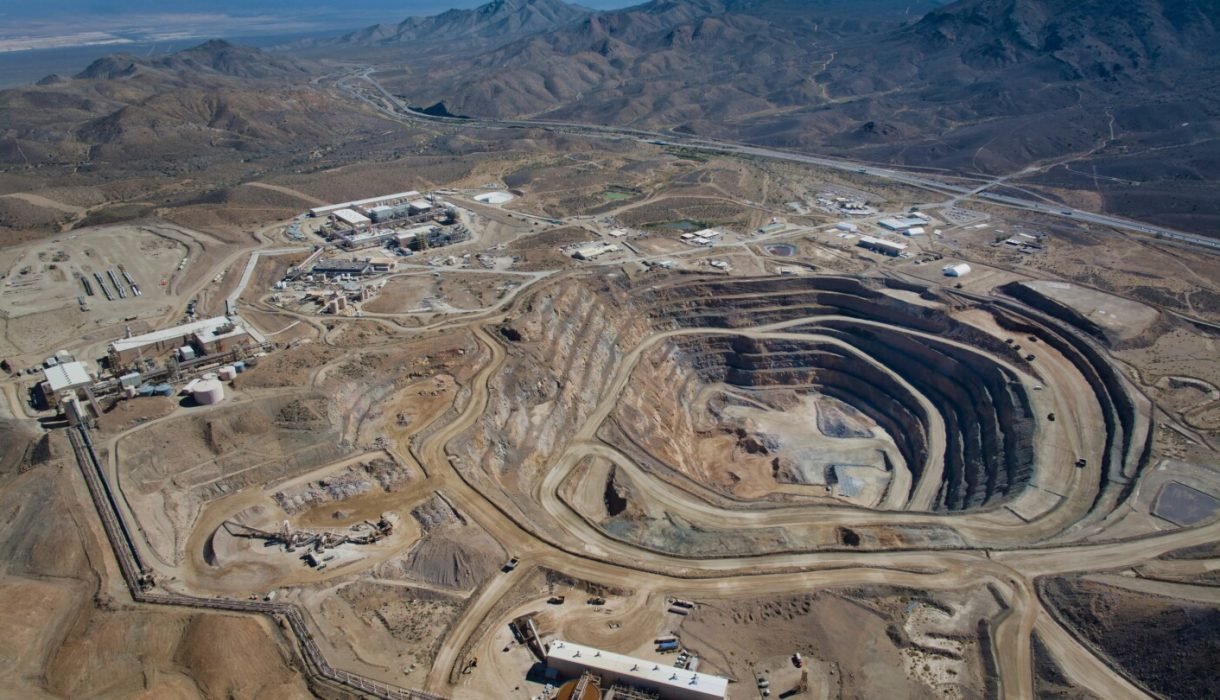
Critical Supply Lines: Unlocking America’s Rare Earth Dilemma.
Posted in :
China’s rare earth export restrictions are shaking global supply chains, exposing the U.S.’s dangerous reliance on a single domestic mine. With defense contractors, battery makers, and tech companies scrambling, the U.S. is racing to revive its rare earth industry—but new mines remain years away.
The implications of China’s rare earth export restrictions on the United States’ supply chains and national security. It discusses the critical dependence on these minerals and the urgent need for America to revive its domestic mining industry.
Imagine a world where your smartphone is no longer functional, your car could not run, and military aircraft are grounded—this is the dire scenario that America faces with its dire dependence on China for rare earth minerals. With only one rare earth mine, the Mountain Pass Mine in California, in operation, America’s vulnerability is exposed more than ever, especially following China’s recent restrictions on mineral exports. The call to action has never been clearer: the U.S. must forge a path toward mineral independence.
The Current State of Rare Earth Mining in the U.S.
The rare earth mining landscape in the United States is a complex and pressing issue. At the heart of this situation is the Mountain Pass Mine, the only active rare earth mine in the country. This mine plays a crucial role in U.S. supply chains, especially as global tensions rise and dependencies on foreign minerals become a national concern.
Mountain Pass Mine: A Critical Resource
Located in California, the Mountain Pass Mine is the sole source of rare earth elements in the U.S. It has become a focal point for discussions about national security and economic independence. The mine produced 45,000 metric tons of rare earths last year. In contrast, China mined a staggering 270,000 metric tons during the same period. This stark difference highlights the U.S.’s vulnerability in the global market.
Why is this important? Rare earth elements are essential for various technologies, from smartphones to military applications. The U.S. relies heavily on these materials, yet it has only one operational mine. This situation raises questions about the sustainability of U.S. supply chains.
China’s Dominance in Rare Earth Mining
China’s grip on the rare earth market is undeniable. They control nearly 90% of the global processing capacity. This dominance poses a significant challenge for U.S. mining companies. The recent restrictions imposed by China on rare earth exports have only intensified these challenges. As noted by Mark Smith, CEO of NioCorp, “
The best way to deal with China’s mineral dominance is to produce our own rare earths here in the U.S.
”
These restrictions have sent shockwaves through the industry. Companies that depend on rare earths for manufacturing are now scrambling to secure their supply chains. The Mountain Pass Mine has seen an influx of inquiries from various sectors, including defense contractors and tech manufacturers. The urgency is palpable.
Challenges Faced by U.S. Mining Companies
Despite the critical need for rare earths, U.S. mining companies face numerous obstacles. Here are some of the key challenges:
- Regulatory Hurdles: Obtaining permits for mining operations can be a lengthy and complicated process.
- Environmental Concerns: Mining activities often face opposition from environmental groups, complicating efforts to expand operations.
- Financial Constraints: Developing new mines requires significant investment, which can be hard to secure.
These challenges are compounded by the fact that the U.S. has become overly reliant on foreign sources for rare earths. The situation is not just about economics; it’s about national security. The Pentagon and defense contractors are particularly concerned about their access to these critical materials.
The Future of Rare Earth Mining in the U.S.
Looking ahead, the U.S. must find ways to bolster its rare earth mining capabilities. The Mountain Pass Mine is currently expanding its operations, but it still lacks the capacity to process heavy rare earths like terbium and dysprosium. These elements are crucial for advanced technologies, including military applications.
As the U.S. government pushes for faster permits and financial incentives to develop domestic supply chains, companies like NioCorp are racing to launch operations. However, the timeline for these developments is uncertain. Even with the right funding and permits, full operations may not commence for several years.
In the meantime, the market is reacting. Prices for rare earth elements are rising, and experts warn of potential shortages. The urgency for the U.S. to establish a more resilient and independent supply chain has never been clearer.
The current state of rare earth mining in the U.S. is a reflection of broader geopolitical dynamics. The Mountain Pass Mine stands as a beacon of hope, but it also underscores the challenges that lie ahead. As the U.S. navigates this complex landscape, the need for strategic autonomy in rare earth production is more critical than ever.
Global Impacts: How China’s Restrictions Ripple Across Industries
China’s recent restrictions on rare earth minerals have sent shockwaves through various industries. These minerals are not just a niche market; they are essential for many sectors, including technology and defense. But what exactly are rare earth minerals, and why are they so crucial?
Industries Dependent on Rare Earth Minerals
Rare earth minerals are vital for a range of industries. Here’s a quick overview:
- Electric Vehicles (EVs): Rare earths are used in batteries and electric motors, making them essential for the EV revolution.
- Smartphones: These minerals are key components in smartphones, powering everything from displays to speakers.
- Military Technology: Rare earths are critical for advanced military applications, including precision-guided munitions and stealth technology.
Without these minerals, the production of electric vehicles and smartphones could face significant delays. The military, too, relies heavily on these materials for its advanced technology. The stakes are high.
Trade Relationships Affected by China’s License Requirements
China’s new licensing requirements for exporting rare earths have complicated trade relationships globally. Companies now need special licenses to export seven key heavy rare earths. This means that manufacturers in the U.S. and elsewhere must seek permission from China to access these critical materials.
As MP Materials stated,
“Selling our valuable critical minerals under 125% tariffs is neither commercially rational nor aligned with U.S. national interests.”
This sentiment reflects the frustration many companies feel as they navigate these new restrictions.
China’s dominance in the rare earth market is evident. In 2022, China mined 270,000 metric tons of rare earths, while the U.S. only managed 45,000 metric tons. With nearly 90% of global processing capacity in China’s hands, the implications for trade are significant.
Potential Shutdowns or Delays in National Defense Projects
The impact of these restrictions extends beyond commercial interests. National defense projects are at risk of delays or even shutdowns. Companies like Lockheed Martin, which manufactures advanced military aircraft, are already feeling the pressure. They are now evaluating their supply chains to mitigate risks associated with rare earth shortages.
As the Pentagon looks to secure its supply lines, the urgency is palpable. A disruption in rare earth supplies could lead to critical delays for military equipment, affecting not only manufacturers but also national security. The consequences of these restrictions could be dire.
Market Reactions and Price Increases
The market has already begun to react to these developments. Since March, the price of terbium has surged by 24%. This increase is a clear indicator of the growing concerns surrounding supply shortages. Experts warn that battery manufacturers could soon face significant shortages, impacting production timelines.
Neha Mukherjee from Benchmark Mineral Intelligence noted,
“There are sufficient reserves in the market to meet demand for now. But shortages could emerge later this year.”
This statement underscores the precarious nature of the current situation.
A Wake-Up Call for the U.S.
The recent restrictions imposed by China serve as a wake-up call for the United States. For years, the U.S. has relied heavily on China for rare earth minerals, neglecting its own production capabilities. Now, as the demand for these minerals skyrockets, the U.S. must reevaluate its strategy.
With defense contractors, battery makers, and tech companies scrambling for solutions, the urgency to revive the domestic rare earth industry has never been greater. However, establishing new mines and processing facilities is not a quick fix. It requires time, investment, and a commitment to building a resilient supply chain.
As the world watches, the race for resource independence is on. The implications of these restrictions will be felt across industries, and the U.S. must act swiftly to secure its future.
Strategies for Resilience: America’s Response to Mineral Dependencies
The United States is at a crossroads. The recent restrictions imposed by China on rare earth exports have exposed a significant vulnerability in America’s mineral supply chain. With only one rare earth mine operating domestically, the situation has become a strategic emergency. The government is now taking steps to address this issue, focusing on several key strategies.
Government Initiatives to Boost Domestic Production
In response to the growing crisis, the U.S. government has initiated several measures aimed at increasing domestic rare earth production. One of the most notable actions was an executive order issued by former President Trump. This order called for:
- Faster permits for mining operations
- An evaluation of national security vulnerabilities related to mineral dependencies
- Financial incentives to develop domestic supply chains
These initiatives are crucial. They aim to reduce reliance on foreign sources, particularly China, which currently dominates the global rare earth market. The urgency is palpable, as defense contractors and tech companies scramble to secure their supply chains.
Investments and Partnerships with Emerging Mining Companies
Another critical aspect of America’s strategy involves forming partnerships with emerging mining companies. Companies like NioCorp in Nebraska and US Critical Materials in Montana are racing to launch operations. NioCorp’s CEO, Mark Smith, emphasized the importance of domestic production, stating,
“The best way to deal with China’s mineral dominance is to produce our own rare earths here in the U.S.”
These partnerships are not just about mining; they also involve investments in technology and infrastructure. The goal is to create a robust supply chain that can withstand external pressures. However, the timeline for these operations is not immediate. Reports indicate that NioCorp’s operations may not begin until near the end of the current administration, highlighting the long road ahead.
Anticipating the Timeline for Self-Sufficiency
As the U.S. works towards self-sufficiency in rare earth production, it is essential to understand the projected timeline. Experts warn that while there are sufficient reserves in the market to meet demand for now,
“shortages could emerge later this year,”
according to Neha Mukherjee from Benchmark Mineral Intelligence. This statement underscores the urgency of the situation.
With the market already reacting to the potential for shortages, the pressure is on. Prices for critical minerals have already begun to rise, and manufacturers are feeling the heat. The timeline for achieving self-sufficiency is uncertain, but the need for action is clear.
Reevaluating National Interests in Critical Resources
America’s response to this crisis involves more than just accelerated production. It requires a reevaluation of what it means to safeguard national interests in critical resources. The country must not only focus on increasing domestic production but also on ensuring that the supply chain is resilient and secure.
For decades, the U.S. has relied heavily on imports for rare earth elements, allowing China to dominate the market. This dependence has left the country vulnerable to geopolitical tensions. Now, as the world’s most powerful economy, the U.S. must take decisive action to regain control over its mineral resources.
The implications of this crisis extend beyond just economic concerns. National security is at stake. Rare earth elements are vital for everything from electric vehicles to advanced military technology. The need for a stable and independent supply chain has never been more critical.
The United States is facing a significant challenge in its quest for mineral independence. The government’s initiatives to boost domestic production, coupled with investments in emerging mining companies, are steps in the right direction. However, the timeline for achieving self-sufficiency remains uncertain. As the nation grapples with its reliance on foreign sources, it must prioritize the development of a resilient supply chain. The stakes are high, and the race to secure America’s mineral future has only just begun. The question remains: will the U.S. rise to the occasion and reclaim its position in the global mineral market?
TL;DR: China’s rare earth export restrictions are shaking global supply chains, exposing the U.S.’s dangerous reliance on a single domestic mine. With defense contractors, battery makers, and tech companies scrambling, the U.S. is racing to revive its rare earth industry—but new mines remain years away.
DomesticMiningSolutions, ChinaExportRestrictions, ElectricVehicleSupplyChain, USMineralIndependence, RareEarthMinerals, MountainPassMine, GlobalMineralMarket, StrategicResources, DefenseContractors, NationalSecurityMinerals
#USMineralIndependence, #ElectricVehicleSupplyChain, #GlobalMineralMarket, #StrategicResources, #RareEarthMinerals, #ChinaExportRestrictions, #DomesticMiningSolutions, #NationalSecurityMinerals, #MountainPassMine, #DefenseContractors,#RareEarth, #MineralCrisis, #ChinaExportRestrictions, #NationalSecurity, #USMining, #MountainPass, #CriticalMinerals, #EVs, #MilitaryTech, #Geopolitics

